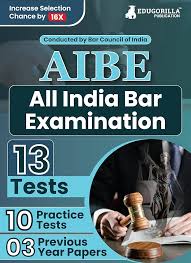All About AIBE Exam 2023: Importance, Format, and Preparation

Introduction
The All India Bar Examination (AIBE) is a crucial assessment for aspiring lawyers in India, enabling them to practice law after completion of their education. Conducted by the Bar Council of India (BCI), this nationwide exam ensures that candidates possess the necessary skills to uphold legal standards in the profession. Given the competitive nature of legal education and the growing number of law graduates, the significance of the AIBE exam cannot be overstated.
Importance of the AIBE Exam
The AIBE aims to test the legal knowledge of candidates in various areas of law, ensuring that only qualified individuals are able to obtain a practicing certificate. It serves as a benchmark for evaluating a candidate’s understanding of law, as well as their ability to apply this knowledge in real-life scenarios. For many, passing the AIBE is a mandatory step towards achieving their career goals in law, making it a critical milestone for new lawyers.
Format of the AIBE Exam
The AIBE is a written examination comprising multiple-choice questions that cover various legal topics, including constitutional law, criminal law, and civil law. The exam usually consists of approximately 100 questions, and candidates have a total of three hours to complete it. The examination is open to law graduates who have completed their degree from recognized institutions. It is conducted in multiple languages, ensuring accessibility for all candidates.
Recent Developments
As of 2023, the Bar Council of India has introduced several changes to the AIBE format and syllabus in response to feedback from past candidates and legal experts. The changes aim to enhance the effectiveness of the exam in assessing foundational legal knowledge and practical skills. Additionally, the BCI has streamlined the registration process and improved the availability of resources for candidates as they prepare for the exam.
Preparation Strategies
Effective preparation for the AIBE exam is critical for success. Candidates are encouraged to create a comprehensive study plan that includes reviewing essential legal concepts and taking mock tests. Resources such as previous years’ question papers and online study materials can be particularly beneficial. Joining study groups or attending preparatory classes can also provide candidates with necessary insights and motivation.
Conclusion
In conclusion, the AIBE exam continues to be a fundamental requirement for law graduates aspiring to practice in India. With its vital role in maintaining legal standards, understanding the format and effective preparation strategies can greatly impact a candidate’s success. As the legal landscape evolves, staying updated with the latest developments regarding the AIBE exam is essential for all future lawyers.









